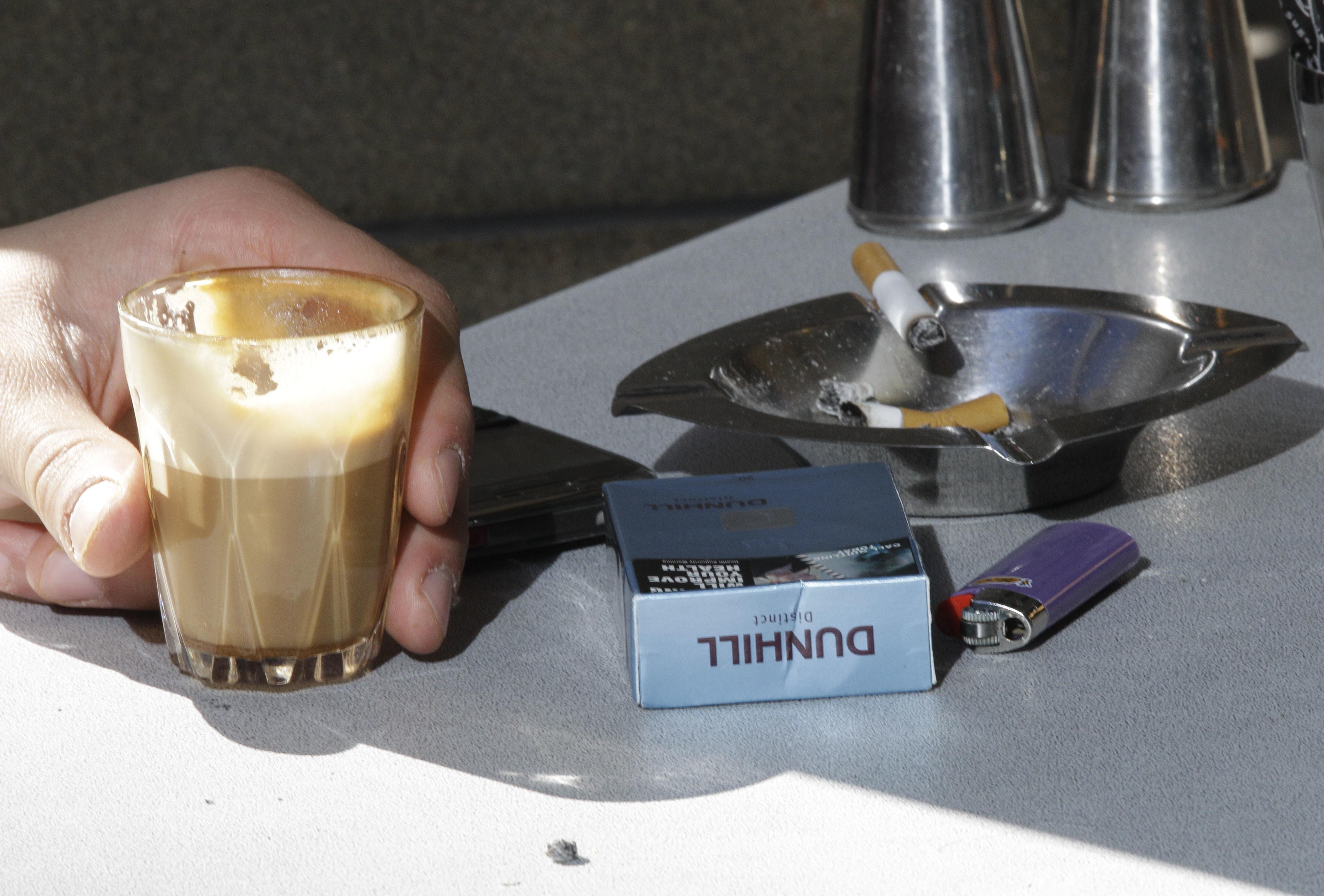 A man reaches for a coffee sitting next to a packet of cigarettes in Sydney, Australia, April 29, 2010. Tobacco companies would be forced to use plain, logo-free packaging on their cigarettes in a bid to make them less attractive to smokers under legislation introduced by Australia's government, which dubbed the move a world-first. (PHOTO / AP)
A man reaches for a coffee sitting next to a packet of cigarettes in Sydney, Australia, April 29, 2010. Tobacco companies would be forced to use plain, logo-free packaging on their cigarettes in a bid to make them less attractive to smokers under legislation introduced by Australia's government, which dubbed the move a world-first. (PHOTO / AP)
Australia once made world history in the fight against Big Tobacco with the introduction of plain packaging for cigarettes in 2012. Carrying forward the campaign, the government has now turned its focus on recreational vaping, which some experts say has reached epidemic proportions, especially among young people.
ALSO READ: Australia to ban recreational vaping in e-cigarette crackdown
Outlining proposed new reforms in an address to the National Press Club in Canberra on May 2, Australia's Health Minister Mark Butler said: "Just like they did with smoking, Big Tobacco has taken another addictive product, wrapped it in shiny packaging and added flavors to create a new generation of nicotine addicts."
Among the measures the government intends to take include a ban on all disposable vapes, which often come in fruity flavors; a ban on import of non-prescription vapes; and limiting nicotine levels on vapes used to help smokers quit
Among the measures the government intends to take include a ban on all disposable vapes, which often come in fruity flavors; a ban on import of non-prescription vapes; and limiting nicotine levels on vapes used to help smokers quit.
Jonine Jancey, professor of health promotion and public health at Curtin University in Western Australia, said: "These new laws will be instrumental in tackling the increase in youth vaping across the nation."
She said vaping has "become a major health concern", especially in regard to young Australians "who are commonly using the products".
Joshua Trigg, public health researcher at Flinders University in South Australia, described the move by the federal government as a "critical step" towards effectively controlling the growing use of nicotine vaping products.
He said the minister's decision to take action, using evidence-backed measures including a focus on packaging design, minimum product standards, and import restrictions, "represents strong action for the health of people in Australia".
Nicotine vapes already require a prescription in Australia, but the industry is poorly regulated, and a black market in flavored vapes is said to be thriving.
Also known as e-cigarettes, vapes heat a liquid — usually containing nicotine — turning it into a vapor that users inhale. They are widely seen as products that can help people quit smoking.
But in Australia, vapes have exploded in popularity as a recreational product, particularly among young people in cities.
The Australian government argues the products are a public health threat, disproportionately affecting young people, many of whom have not smoked before.
Research says one in six Australians aged 14-17 years old has vaped, and one in four people aged 18-24.
"This is a product targeted at our kids, sold alongside lollies and chocolate bars," Health Minister Butler said.
"Vaping has now become the number one behavioural issue in high schools. And it's becoming widespread in primary schools as well," he added.
Australia already has some of the toughest anti-smoking laws in the world. Butler compared the proposed vape reforms to those used to bring cigarette smoking in Australia to one of the lowest levels among advanced countries.
READ MORE: Britain to encourage smokers to swap cigarettes for vapes
Kelly Burrowes, associate professor at the Auckland Bioengineering Institute, University of Auckland, said: "Australia is continuing to impose some of the strictest measures in the world around vaping, aside from countries that outright ban vaping such as Singapore and Brazil."
Among other governments, China banned the sale of flavored e-cigarettes as part of a wide-ranging crackdown on the industry in late 2022.
Under China's rules, vapes that have flavorings other than tobacco — such as those that taste fruity or sweet — cannot be sold in the domestic market.
Terry Slevin, CEO of the Public Health Association of Australia, has described vaping as a "public health disaster", and the unprecedented uptake of electronic cigarettes around the world has been termed an epidemic.
READ MORE: Chinese investments in Australia stay low despite pick-up
Burrowes said that in New Zealand 8.3 percent of adults report being vape users, and one in four high school students self-report as current users.
"While electronic cigarettes are generally thought to be safer than conventional cigarettes, and are currently deemed a promising smoking cessation aid, there is mounting evidence that vaping is not benign," she said.
With a general election due later this year, the New Zealand government is not expected to move against vaping.
Bryan Betty, chair of General Practice New Zealand, a health advocacy organization, told Radio New Zealand on May 3 that an urgent debate is needed on what New Zealand could do next.
"Now is the time to really start to think about this. Maybe the Australian experience or what's happening there at this point, will give an impetus for those discussions and real thinking about what is done in the New Zealand context," he said.
karlwilson@chinadailyapac.com